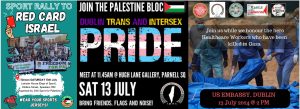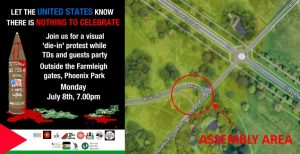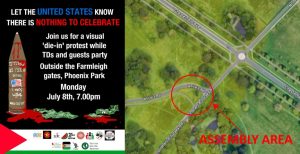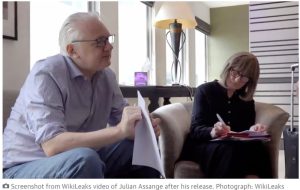Our position on the events in Libya
Abdel al-Bari Atwan is the editor-in chief of the London-based newspaper Al-Quds Al-Arabi
26 April 2011
I have to admit that I am engulfed by sadness every time I come to write about
the way the Libyan situation is unfolding; when I witness the way the country is
being torn apart and how the whole nightmare is being completely mis-represented
and distorted by a huge media machine, paid for by parties with enormous funds,
and which has almost dominated Arab public opinion.
The rebellion started out in all innocence with protestors demanding freedom,
social justice and the rule of law from the Colonel Gadaffi’s dictatorial
regime. The people had finally had enough of their country being treated like a
private estate by Gadaffi and his sons: even to the point where, when one of
these sanctified heirs was arrested in Switzerland, Gadaffi threatened to cut
off that country’ supply of Libyan oil. He even went so far as to call for
fragmenting Switzerland and handing its parts over to Germany, Italy, and
France.
The revolution was legitimate, increasingly so when Gaddafi threatened to crush
Our position on the events in Libya
Abdel al-Bari Atwan is the editor-in chief of the London-based newspaper Al-Quds Al-Arabi
26 April 2011
I have to admit that I am engulfed by sadness every time I come to write about
the way the Libyan situation is unfolding; when I witness the way the country is
being torn apart and how the whole nightmare is being completely mis-represented
and distorted by a huge media machine, paid for by parties with enormous funds,
and which has almost dominated Arab public opinion.
The rebellion started out in all innocence with protestors demanding freedom,
social justice and the rule of law from the Colonel Gadaffi’s dictatorial
regime. The people had finally had enough of their country being treated like a
private estate by Gadaffi and his sons: even to the point where, when one of
these sanctified heirs was arrested in Switzerland, Gadaffi threatened to cut
off that country’ supply of Libyan oil. He even went so far as to call for
fragmenting Switzerland and handing its parts over to Germany, Italy, and
France.
The revolution was legitimate, increasingly so when Gaddafi threatened to crush
the rebels, and hunt them down from house to house. Saif al-Islam, his son and
heir apparent, promised to end the task in the city of Benghazi in less than
forty-eight hours.
Suddenly the peaceful revolution turned into a military rebellion, and our
television screens were filled with images of rebels riding tanks, brandishing
heavy weapons and making victory signs every time they liberated a city or
position, dancing in jubilation over the bodies of Libyan soldiers loyal to the
dictator – soldiers who only a few months earlier were the pride and joy of all
the Libyan people.
The rebels initially said they rejected foreign interference in all its forms,
then they asked for the implementation of a no-fly zone to protect civilians
from the tyrant’s aircraft and his bloodthirsty reprisals. In the absence of any
Arab intervention, all parties welcomed the UN Security Council resolution
[1973] which enabled this and saw it as clearly the only option to prevent a
bloodbath in Benghazi at the hands of the Colonel and his sons.
Until then the media picture was clear: visually confirming the poorly armed and
equipped rebels’ struggle against heavily armed tanks, airplanes and an army of
mercenaries, some from Africa and others from other Arab countries.
The real turn around took place when NATO stepped up its operations, and began
to deviate from the mandate of UN Security Council resolution; NATO planes
pounded the other party with more than 150 cruise missiles, and tonnes of bombs,
killing a great many soldiers on the ground. General Mullen, US chairman of the
Joint Chiefs of Staff, said that NATO air operations had destroyed more than
forty per cent of the Libyan regime’s defence capabilities.
What we are witnessing is, in fact, the Libyan tyrant seeking the assistance of
barefoot, poorly clothed mercenaries facing an armed opposition assisted by
mercenaries heavily armed with rockets and aircraft under the banner of NATO,
which comprises more than 40 nations, led by the United States.
More than that, the Gaddafi regime is now fighting a NATO-backed breakaway wing
of itself. The composition of the rebel leadership bears this out: their
commander is Col. Khalifa Heftar who has been trained by the CIA in Virginia
where he lived for more than 20 years; Major-General Abdel Fattah Younis was
Gadaffi’s minister of the interior until February – along with the self-styled
‘President of the Revolution’, former Minister of Justice Abdul Jalil Mustafa,
he was responsible for one of the most brutal and repressive security
instruments in the Middle East.
What we are currently witnessing is a power struggle between two wings of a
repressive, dictatorial regime, and not a struggle for democracy, human rights
and the Libyan people’s prosperity. Major-General Younis served Colonel Gaddafi
for more than forty years and is well aware of all his crimes against the Libyan
people; and Mr. Abdul Jalil Mustafa in his previous incarnation sentenced
opponents of the dictatorial regime to torture and death – how then, can he now
be fair?
These men have simply shifted their loyalties from the service of the Libyan
regime’s repressive authoritarianism to fight under the banner of NATO. They do
not care at all, it is as simple as shifting the gun from one shoulder to
another. Even if thousands of people on both Libyan sides are killed. It is as
though those thousands were not Libyan Arabs and Muslims.
Military experts from Britain, France and Italy are training and guiding Libyan
opposition troops while US drone aircraft are currently launching continuous
bombardments of the other side’s positions in Tripoli, Sirte and Sabha. Their
most recent strike on Bab al-Aziza in Tripoli wrecked Colonel Gaddafi’s offices,
killing and wounding dozens.
There is a new equation in Libya: the dead who fall at the hands of Gaddafi’s
brigades are martyrs of the first class, while those who are killed by NATO
missiles or US drone attacks – even if they are innocent and in the wrong place
at the wrong time – are not martyrs at all.
Mr Musa Kusa, the Libyan leader’s head of intelligence for twenty years, and his
foreign minister for three, and before that his ambassador to several countries,
was always full of fulsome praise for his Boss and his ‘revolutionary spirit’.
Now he has now given British, US and French intelligence a wealth of information
about Gadaffi and his habits: it cannot be ruled out that the information that
Kusa gave to these intelligence agencies may help NATO aircraft to kill Gadaffi,
if they can, or kidnap him in the days or weeks ahead.
Mr Musa Kusa was the head of intelligence when his units opened fire on trapped
prisoners in the infamous Abu Salim jail in Tripoli, massacring more than 1200
men. Not one of his eager interlocutors has asked Mr Kusa a single question
regarding his role in this crime against humanity. Nor was this the only
massacre in Libya, but Mr Kusa is innocent simply because he has transferred his
gun from one shoulder to the other, and the same applies to all those other
Libyans of his ilk.
This tripartite aggression by the US, France and Britain is not new to Libya and
nor is the involvement of Italy in its affairs: in 1943 the former Italian
colony’s three administrative districts (Tripolitania to the Western North,
Cyrenaica to the East and Fezzan to the Western South) were divided between
Britain – which took administrative control of the first two – and France which
controlled Fezzan. The US established the Wheelus airbase near Tripoli and five
others within Libya, thus establishing its influence in the country’s future.
It is incontesable that the overwhelming majority of Libyans want the departure
of Libyan leader, his family and all his bloodthirsty cohorts, but the question
that arises now is how much the Libyan people are going to have to pay for NATO
to accomplish this task. Furthermore, how is this NATO engagement going to
impact on Libya’s future, given the devastation NATO and foreign intervention
has caused in Iraq and Afghanistan.
We are not allowed to ask such questions, for accusations are ready that we
receive money from the Libyan leader, and that we are clients of his regime. Yet
nobody questions the motives of NATO or the intentions of the US administration:
these are charitable angels and anyone who doubts them for one minute is
regarded as insane, foolish, and a supporter of dictatorships, tyrants, and the
repression of freedoms.
Arab League Secretary General Amr Musa is utterly silent and has kept away from
the limelight. He said that the Arab League’s request for foreign intervention
in Libya was not intended to protect some Libyans and kill others. He has been
the target of a vicious attack for making that statement, though he said the
truth. Likewise, we too would be attacked if we say that truth. Musa was also
due to sign the statement issued jointly by Barack Obama for the United States,
Nicolas Sarkozy for France, and David Cameron for Britain. That statement
demanded the departure of the Libyan leader, not only from Tripoli, but from
Libya. Yet it was not said where he should go…perhaps to the other world. Musa
did not sign that statement because he deeply regretted his support for foreign
intervention in Libya.
It causes us great anguish to see our Libyan brothers burning in the fire of
ferocious civil war. We have supported, and will continue to support Arab
revolutions everywhere; but with anguish we see that the Libyan revolution has
been hijacked by military men and politicians from the inner chambers of
Gadaffi’s tyranny who are motivated by their own personal desires for power and
revenge. These motives they have sugared with a thin coating of the flavour of
the times and a suggestion of concern for the people.
I would like to conclude this commentary by responding in advance to those who
will launch into accusations that I side with Colonel Gadaffi, his crimes, and
tyranny. When we were attacking Gadaffi and his regime, as we often have done
over the years, most of his current opponents were either serving his regime and
reaping millions of dollars, or standing in line in front of Sayf al-Islam
al-Qadhafi’s headquarters in London, writing accounts about his reformist
intentions and giving their blessing to the prospect of his succession to his
father. All those accounts are still in the archives of Al-Quds al-Arabi.
Abd-al-Rahman Shalqam, the former Libyan foreign minister and one of the
opposition leaders, knows full well whether or not we were pro-Gadaffi regime at
the peak of his regime’s power, and whether or not we received his bribes in the
millions of dollars. We will accept Shalqam’s testimony because he is a man of
conscience and ethics.
The only party that we will support is one which will strive in the first place
to spare the blood of our brethren in Libya, and then to champion true reform
and democracy. Libya’s future should be decided according to the example set by
Abu-Musa al-Ash’ari in a similar situation fourteen centuries ago . That is –
both the tyrant and those fighting under NATO’s wing should remove themselves
from the stage and allow the true revolutionaries, the young people who have had
the courage to rise up and stake their claim on the future, to form a new
leadership.






